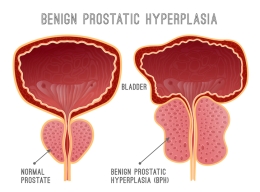What Men Need to Know About BPH and Enlarged Prostate
Medically Reviewed by Ronald P. Glinski, MD
McLeod Urologist Dr. Ronald W. Glinski explains the importance of understanding Benign Prostatic Hyperplasia (BPH).
As men age, prostate health often becomes a concern. One of the most common issues is Benign Prostatic Hyperplasia (BPH), also known as an enlarged prostate. It’s important for men to understand what BPH is, how it affects their health, and when to seek treatment.
The prostate is a gland found only in males and is located below the bladder and in front of the rectum, surrounding the urethra. According to the American Urological Association, nearly 80 percent of men will develop BPH, and about 30 percent will need treatment for it. As the prostate enlarges, it can squeeze the urethra, causing symptoms like a weak urine stream, difficulty starting urination, or the feeling that the bladder is not completely empty.
Some of the most common signs of BPH include:
- Frequent urination, especially at night
- A weak or interrupted urine stream
- Difficulty starting or stopping urination
- The feeling that the bladder isn’t fully empty
In more severe cases, BPH can lead to complete urinary retention or kidney problems, so it’s important to seek medical care if symptoms significantly impact daily life. Immediate consultation with a doctor is necessary if there’s blood in the urine, pain or burning during urination, or an inability to urinate.
Not all cases of BPH require treatment. For mild symptoms, monitoring may be enough. However, if symptoms worsen, several treatment options are available. Doctors may recommend oral medications to relax the bladder or shrink the prostate, or minimally invasive procedures like the Rezum or Urolift, which help reduce the size of the prostate with less risk and quicker recovery times.
In some cases, surgery may be necessary, particularly when symptoms are severe. A surgical option now offered at McLeod Regional Medical Center is Aquablation Therapy. Aquablation Therapy combines real-time, multi-dimensional imaging, automated robotics, and heat-free waterjet ablation for targeted, controlled, and immediate removal of prostate tissue.
While BPH is not cancer, it can occur alongside prostate cancer, which often has similar symptoms. Regular checkups are essential to detect both conditions early. Men experiencing symptoms should consult a urologist to explore the best treatment options and improve their quality of life.
Dr. Ronald W. Glinski provides care for the full spectrum of urological concerns. Dr. Glinski serves patients at McLeod Urology Associates in Florence. To schedule an appointment, call 843-777-7555.
-
McLEOD REGIONAL MEDICAL CENTER FLORENCE
843-777-2000 -
McLEOD DARLINGTON
843-777-1100 -
McLEOD DILLON
843-774-4111 -
McLEOD LORIS
843-716-7000 -
McLEOD SEACOAST
843-390-8100 -
McLEOD CHERAW
843-537-7881 -
McLEOD CLARENDON
803-433-3000



-
McLEOD REGIONAL MEDICAL CENTER FLORENCE
843-777-2000 -
McLEOD DARLINGTON
843-777-1100 -
McLEOD DILLON
843-774-4111 -
McLEOD LORIS
843-716-7000 -
McLEOD SEACOAST
843-390-8100 -
McLEOD CHERAW
843-537-7881 -
McLEOD CLARENDON
803-433-3000
 Find a Doctor
Find a Doctor  Locations
Locations  Services
Services 